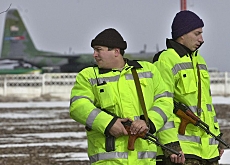
Government defends stance on CIA prisons

One week after media revelations that the Swiss authorities allegedly knew of the existence of secret CIA prisons in Europe, three ministers have spoken out.
They rejected criticism from the Council of Europe’s investigator that Switzerland and other European countries have failed to take the White House to task over the issue.
Foreign Minister Micheline Calmy-Rey told the NZZ am Sonntag newspaper that the information contained in a secret document published last week by the tabloid SonntagsBlick was not spectacular.
The document was a leaked report about an Egyptian fax – intercepted by the Swiss intelligence services – which claimed the Americans were operating a secret prison in Romania to interrogate suspected terrorists.
The Egyptians also allegedly had proof of detention centres in other parts of eastern Europe.
Calmy-Rey said the report showed that the secret services had informed the authorities correctly. For the foreign minister, the real problem was that the document had been made public and that the leak had damaged the Swiss government’s credibility.
The foreign ministry has spent the last week carrying out damage control, patching up its relationships with Romania, Bulgaria, Ukraine, Kosovo and the former Yugoslav republic of Macedonia. These countries and regions were all specifically named in the fax.
“The countries whose names were revealed weren’t particularly happy,” Calmy-Rey told the Matin Dimanche newspaper.
Accusations
She also defended the government against accusations that it had remained too passive in the CIA prison affair.
On Friday, the Swiss parliamentarian heading a European investigation into the alleged CIA prisons, Dick Marty, said United States anti-terror policies contravened human rights law. He claimed that Switzerland and other European nations were not doing enough to condemn such policies.
Marty said that European governments had been “complicit” in the CIA’s alleged activities. “What was shocking was the passivity with which we all, in Europe, have welcomed these things,” he added.
But Calmy-Rey said there was still no proof of the existence of the prisons.
“[Given the situation,] we have done all we can,” she said.
The Swiss authorities have demanded explanations from the Americans, according to Calmy-Rey, who added that Switzerland had repeated its request a number of times in no uncertain fashion and would continue to do so.
Holy See
The Swiss finance minister, Hans-Rudolf Merz, and the interior minister, Pascal Couchepin, took time out on Saturday to react to the comments made by their Radical Party colleague Marty.
For Couchepin, the government must maintain good relations with other countries, including the US.
“I don’t think Switzerland should be the moral guardian of the world,” he told Swiss public radio. “Switzerland defends moral principles, but we aren’t the Holy See for human rights.”
Merz said the government could not speak out in the way that Marty had done since it did not have enough facts available.
The results of a poll published on Sunday by the SonntagsBlick show that three out of four Swiss believe that the government should make a formal protest to the US authorities about the alleged CIA prisons.
Only 20 per cent of those surveyed agree with the government’s position so far.
Two-thirds of those polled believe that the authorities should have passed on any secret information they had to Marty.
Nearly 85 per cent said they reject the use of torture in the fight against terrorism.
swissinfo with agencies
Last Sunday, the SonntagsBlick published a confidential intelligence report on a fax sent by Egypt’s foreign ministry to the Egyptian embassy in London confirming the existence of secret prisons in Europe.
Fearing the affair could discredit the Swiss intelligence agencies, a parliamentary sub-committee last week called on the government to act.
On Monday military prosecutors opened an investigation into the SonntagsBlick’s editor and two journalists, suspected of publishing military secrets.
On Wednesday, the government officially condemned the leak.
November 2, 2005: The Washington Post reports that the CIA is detaining members of al-Qaeda in eight eastern European countries and Asia.
November 7: Swiss parliamentarian Dick Marty is appointed head of a Council of Europe inquiry into the allegations.
December 8: The American secretary of state, Condoleezza Rice, refuses to answer questions on the subject during a tour of Europe.
December 14: The Swiss parliament demands a report from the government on alleged CIA flights transporting detainees in Swiss airspace.
January 8, 2006: The SonntagsBlick newspaper claims to have received a copy of a fax from the Egyptian government confirming the detention centres.

In compliance with the JTI standards
More: SWI swissinfo.ch certified by the Journalism Trust Initiative

























You can find an overview of ongoing debates with our journalists here . Please join us!
If you want to start a conversation about a topic raised in this article or want to report factual errors, email us at english@swissinfo.ch.